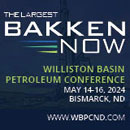Bismarck, N.D. – The Bureau of Land Management’s (BLM) unnecessary and duplicative proposed rules for venting and flaring could reduce production on impacted leases, reduce state tax revenues and cost thousands of private royalty owners millions in lost royalty income, according to the North Dakota Petroleum Council (NDPC).
“The industry supports the goals of capturing greater quantities of associated gas and reducing waste but this one-size-fits-all federal process could come at a huge cost to North Dakotans while providing few – if any – benefits,” said Tessa Sandstrom, communications manager for the NDPC.
Early industry estimates anticipate production could decrease by more than 20 percent from more than 2,780 affected wells. This would cost the state $23.8 million in oil and gas severance taxes and North Dakota mineral owners more than $39.1 million in lost royalty income if the rule were fully implemented.
“The BLM claims that they could collect $23 million in additional royalty revenues for the federal government, but even if that were true, it would be at the expense of more than $62.9 million in tax revenues and royalty income in North Dakota alone,” said Sandstrom.
“North Dakota already has some of the most comprehensive regulations addressing flaring in the nation. Over the past two years, North Dakota has adopted a series of strict gas capture targets. At the same time, the industry has voluntarily made huge strides in natural gas capture by investing more than $13 billion in natural gas infrastructure since 2006. As a result, flaring has declined even as natural gas production increased.
“This progress has been despite federal regulations, which is often responsible for delays preventing industry from building infrastructure needed to capture more gas. BLM’s staff, time and resources are already overtaxed. Implementing rules and regulations that are already covered by state or other federal agencies is unnecessary and will only further burden employees and dilute their ability to perform their duties. BLM and other federal agencies could make a larger, more immediate impact on reducing flaring by instead fixing permitting, infrastructure and pipeline delays.”
About the North Dakota Petroleum Council
Since 1952, the Petroleum Council has been the primary voice of the oil and gas industry in North Dakota. The Petroleum Council represents more than 500 companies involved in all aspects of the oil and gas industry, including oil and gas production, refining, pipeline, mineral leasing, consulting, legal work, and oil field service activities in North Dakota, South Dakota, and the Rocky Mountain Region. For more information, go to www.ndoil.org.
Media Contact:
Tessa Sandstrom, Communications Manager | ND Petroleum Council
701.223.6380, tsandstrom@ndoil.org






